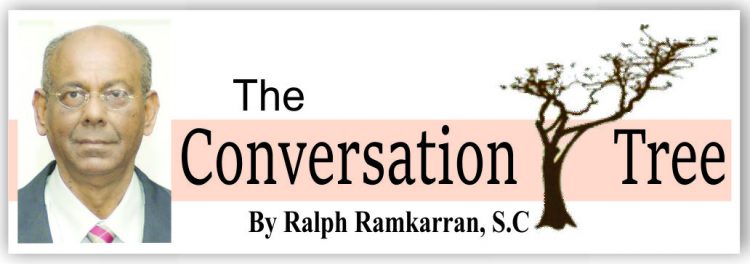 Article 147(2) of the Constitution provides that: “Except with his or her own consent no person shall he hindered in the enjoyment of his or her freedom to strike.” The next article, 147(3) provides that: “Neither an employer nor a trade union shall be deprived of the right to enter into collective agreements.” Guyana has gone further than any other Caribbean country in enshrining in its Constitution positive references to striking and collective bargaining. This attests to Guyana’s specific history and to the history of the Caribbean where most ruling and opposition political parties have their origins in trade unions.
Article 147(2) of the Constitution provides that: “Except with his or her own consent no person shall he hindered in the enjoyment of his or her freedom to strike.” The next article, 147(3) provides that: “Neither an employer nor a trade union shall be deprived of the right to enter into collective agreements.” Guyana has gone further than any other Caribbean country in enshrining in its Constitution positive references to striking and collective bargaining. This attests to Guyana’s specific history and to the history of the Caribbean where most ruling and opposition political parties have their origins in trade unions.
The relations between an employer and a worker are based on a contract, the terms of which are mutually agreed between the parties. In modern times, after centuries of struggle by workers, they have obtained the right to form trade unions, the right to have their trade unions recognized if the majority of workers support the particular trade union and protection of laws passed by the State because of the unequal bargaining power of workers. Minimum wages and working hours are specified by law for many categories of workers who are not perceived to have the bargaining power to negotiate and who might be susceptible to exploitation. The legal status of trade unions and their rights are protected by the Trade Unions Act.
Contracts between employers and employees had historically not been legally enforceable. Following English common law, there are several cases by Guyana’s Court of Appeal reinforcing this principle. However, during the late 1970s and early 1980s when the Government was seeking to limit wage increases and there was an upsurge of trade union activity and legal cases by workers to enforce wages agreements, the Government passed legislation in 1984 which is now enshrined in section 30 of the Labour Act that provides for collective agreements made after the passage of the legislation to be legally enforceable unless such agreements specifically state that they are not.
Neither the Constitution, the Trade Unions Act, the Trade Union Recognition Act, nor the Labour Act accords recognition to a right to strike. Of all these laws the Constitution goes the furthest by recognizing a “freedom” to strike and requiring that no “hindrance’ be placed on that “freedom.” The word “hindered” in law came up for consideration in the case of Hope v New Guyana Co Ltd decided by the Court of Appeal in 1979, in the middle of the era of State assaults against the rights of the Guyanese people. The Court held that Trade Orders Nos. 86 of 1971 and 12 of 1972 made under section 5(1)(b) of the Trade Act prohibiting importation of newsprint and printing equipment except under a licence granted by the Competent Authority did not “hinder” the New Guyana Co. Ltd from enjoying its freedom of expression under article 12 of the Constitution. Article 12 provided: “Except with his own consent no person shall be hindered in the enjoyment of his freedom of expression…” The Constitution accords a “freedom” to strike as well as a “freedom” of expression. In both cases the Constitution proscribes a “hindrance” to each freedom – to strike and of expression. In the case of Hope v New Guyana Co. Ltd., the “hindrance” was two orders made under the Trade Act that allegedly “hindered” freedom of expression.
There are no reported laws passed or orders made that “hindered” the Guyana Teachers Union (GTU) from enjoying the freedom to strike. It appears that the Court’s decision was founded on an analysis of the agreement between the government and the GTU, the facts leading up to the strike and whether or not it was the GTU or the government that violated the terms of the agreement. This issue related to the negotiations between the parties, the matters on which negotiations took place or were supposed to take place and whether they took place or not. Findings were apparently made by the Court on these issues and it appears that it was on the basis of these findings the Court held that the strike was lawful. If this conclusion is accurate, it would have meant that the Court found that the Government violated the agreement. Unless the agreement itself accorded the GTU the right to withdraw its labour for a violation of its terms by the government, the lawfulness of the strike would not have depended on anything done or not done by the parties to the agreement, but on the Constitution and whether the government “hindered” the GTU from striking. Newspaper reports were not adequate enough to clarify this situation. The Court’s decision, when available, will clarify.
Issues relating to the role of the Chief Labour Officer (CLO) and the Minister of Labour in relation to arbitration arose in the GTU case. There is a valid view that both are required to intervene in a labour dispute as part of their functions. The CLO has only persuasive authority and under Section 4 of the Labour Act the Minister’s functions are discretionary. He can take action “if he thinks fit.” This may be an opening for a court in an appropriate case to rule that a Minister ought to exercise his discretion to act under section 4. But that is another issue for another day.
(This column is reproduced with
permission from Ralph Ramkarran’s blog, www.conversationstree.gy)




